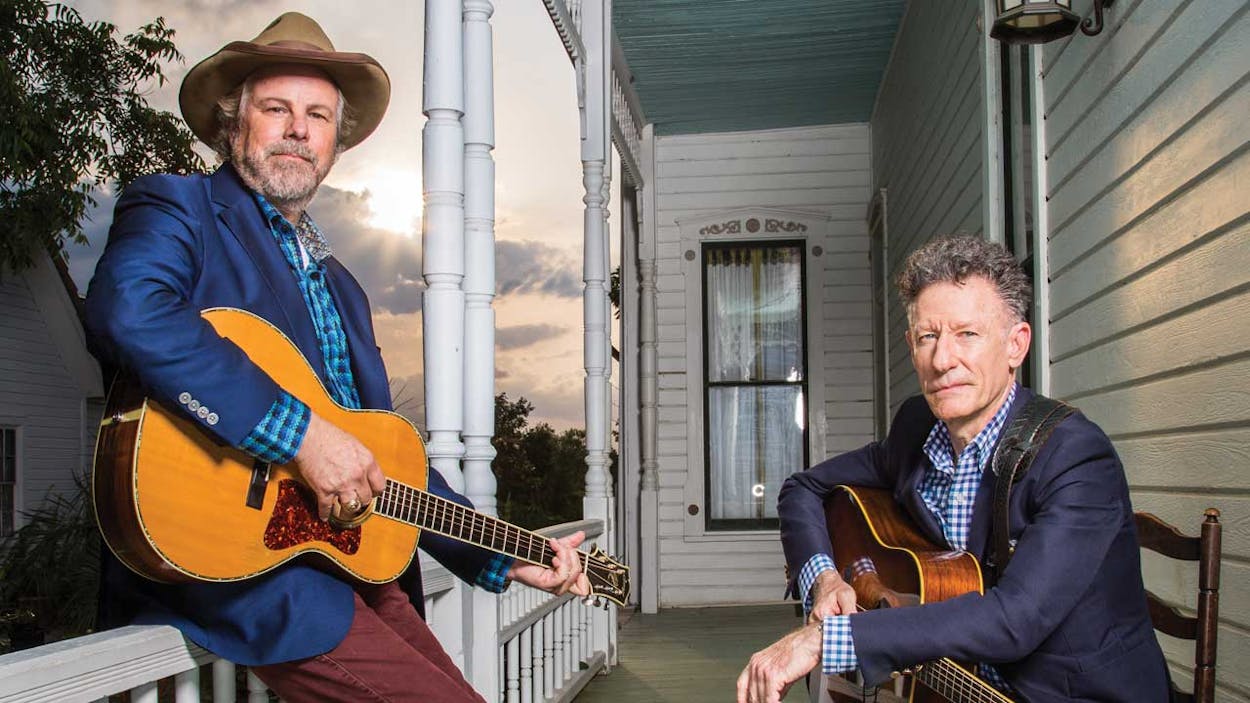Michael Hall: Why does Texas have such a rich songwriting tradition?
Lyle Lovett: In Texas there are so many places to play music, and people play for the love of it, because music is a joyful experience—it’s just fun. Other parts of the country, people play for a record company showcase or some business reason. Also, there’s something about the Texas mind-set: people like to tell stories, make stuff up. That’s part of our heritage. Songs are just an extension of the culture.
Robert Earl Keen: It seems to be popular in other parts of the country to actually copy the song and do the best you can. Here, and I think it goes back to the Alamo or that Australian mind-set of all those criminals who came down to Texas to get away from Tennessee or were just running away, but there’s this independent spirit. People think, “Yeah, I could copy that, but it would be more fun to write it myself, give my interpretation.” A more academic answer is that in the early twentieth century that was your form of entertainment on ranches or in small towns like London or Alpine. People would get together and play music in religious services or as a form of entertainment.
MH: It was the only thing to do.
REK: Right. The family group would only have ten songs, and Uncle Zane would say, “I could make up a song!”
MH: What pushed you to write songs?
LL: There was no value to me as a performer to play a Willie Nelson or Willis Alan Ramsey song. I couldn’t play it as well as they could, so why do it? I thought, “If I have a chance at being interesting to someone, I need to have my own point of view.” There had to be something that I was doing that people could only get from me.
REK: The irony is that Lyle is one of the best interpreters of other people’s songs, and it’s probably because of that point of view, thinking, “How would I do this song?”
MH: What are the Texas songs you learned from?
REK: I loved all those Bob Wills songs—“San Antonio Rose,” “Ida Red,” “Stay a Little Longer.” The first song I ever learned was “Hello Walls,” by Willie. “Walking the Floor Over You,” by Ernest Tubb. “La Grange”—a friend and I would get a six-pack of Texas Pride and get in his pickup and pop that in the eight-track and blast it out of the windows, blowing it down.
LL: When I started trying to learn songs, I was listening to Guy Clark, Townes Van Zandt, Willis Alan Ramsey, Steve Fromholz, B. W. Stevenson, Michael Murphey. The songs I learned first were narratives—Guy Clark’s “Let Him Roll”; “The Ballad of Spider John,” by Willis; “Pancho and Lefty,” by Townes; “Texas Trilogy,” by Fromholz. There were so many songs—“Alleys of Austin” and “Drunken Lady of the Morning,” by Murphey; B.W.’s “On My Own.”
MH: You two guys started playing music together almost forty years ago—and you’re still doing it. And that song you wrote together back then, “The Front Porch Song,” still resonates today. You realize how rare this is, right?
LL: I’m proud of that song—I feel it represents our friendship, which is very important to me. And it’s really cool to be able to do something in your life that you love to do—to be able to do for a living what you do for fun, that’s the biggest blessing in the world.
REK: And then having a connection with someone you have a shared experience with—like, the excitement of talking about gigs back then. I remember when Lyle got to open for Doyle Lawson & Quicksilver at Rockefeller’s. We didn’t give a damn about Doyle Lawson & Quicksilver, but, “You’re playing Rockefeller’s!” We had a lot of classes together too.
LL: We took summer school together the summer of ’76—American Literature.
REK: That’s when I realized, Lyle’s a much better prose writer than I could ever hope to be. He wrote this amazing piece on how he spent the weekend with his friend Tony Gallucci, and he referenced Hawthorne and he got an A–, and mine was footnoted and everything and I got a B–. The magic of beautiful prose—that’s a powerful thing.
MH: Usually musicians who play together when they’re young diverge, stylistically and personally. You guys haven’t.
LL: Robert and I were friends, and playing music was something we had in common, but our friendship was based on our personal feelings about one another. I don’t have brothers and sisters, but I felt close enough to Robert to tell him what I was thinking, and I wanted to hear what he was thinking. When I’m with Robert, when I’m with this man here, I find that I think of things that I wouldn’t think of unless I was sitting with him—whether it’s in conversation or writing a song, he has that effect on me. He’s a catalyst in that way. That’s a rare thing in life.
REK: It crosses over—I remember living in Austin and I wrote this song, “Rollin’ By.” I called him up and said, “I wrote this song, and it’s the kind of song you would write.” It’s the same effect: I had gleaned or absorbed certain ways of thinking that I wouldn’t have on my own.
LL: I learned it immediately and recorded it on Step Inside This House. I’ve always loved that song.
- More About:
- Music
- Robert Earl Keen
- Lyle Lovett









